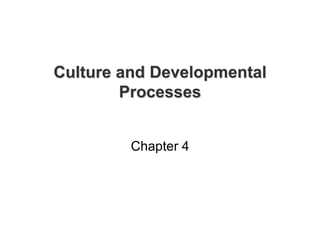
Matsumoto juangchapter4
- 1. Culture and Developmental Processes Chapter 4
- 2. Outline Culture and Temperament Culture and Attachment Cognitive Development Moral Reasoning Other Developmental Processes Conclusion
- 4. Traditional Knowledge Temperament: Biologically based style of interacting with world Easy: regular, adaptable, mildly intense style Difficult: intense, irregular, withdrawing style Slow to warm up: need time to make transition Goodness of fit: interaction of child’s temperament with that of parents
- 5. Cross-cultural differences in temperament Temperament: Biologically based style of interacting with world Easy: regular, adaptable, mildly intense style Difficult: intense, irregular, withdrawing style Slow to warm up: need time to make transition Goodness of fit: interaction of child’s temperament with that of parents
- 6. Cross-Cultural Studies on temperament Differences in temperament Chinese American babies Japanese and Navajo babies Cross-cultural studies using the Neonatal Behavior Assessment Scale Differences due to cultural practices of caregiving, cultural goals for appropriate behavior, cultural ideas on capabilities of babies
- 7. Cross-Cultural Studies on temperament Temperament and learning culture Differences in temperament may reflect cultural values on appropriate ways of acting and being The goodness of fit between temperament and culture “Difficult” temperament may be adaptive in one culture Need to interpret infant disposition and behavior in cultural context
- 8. Cross-Cultural Studies on temperament Sources behind temperamental differences Cultural values, environmental demands, cultural experiences (diet and culture-related practices), physiological aspect of mother
- 10. Attachment: Special bond between infant and caregiver Provides child with emotional security
- 11. Bowlby’s Theory of Attachment Infants must have preprogrammed, biological basis for becoming attached to caregivers Attachment is survival strategy
- 12. Ainsworth’s Classification System of Attachment Ainsworth’s study in Uganda Three attachment styles: secure, ambivalent, avoidant Replicated in Baltimore Similar distribution of attachment styles in other cultures But, in Dogon of Mali, no avoidant infants; in Israel,more ambivalent babies
- 13. Cross-Cultural Studies on Attachment Hundreds of studies on attachment conducted in cultures all over the world Weak association between parent sensitivity and security of attachment Cultures differ in conceptualization of sensitive parenting
- 14. Cross-Cultural Validity of Assessing Attachment Meaning of Strange Situation Meaning of separation different across different cultures ex) Japanese babies Avoidant attachment as an indicator of insecure attachment Reliance on nonparental caregivers for Chinese may account for avoidant attachment behavior Subtle attachment behaviors difficult for coders from different cultures
- 15. Is secure attachment a universal ideal? In United States, secure attachment ideal Some cultures differ in what is considered ideal Ex) German mothers, Israeli children, Japanese children Nonetheless, many cultures consider secure attachment ideal
- 16. Attachment and Child Development Attachment predicts child competence and health Relationship between temperament and attachment More research needed in this area
- 18. Piaget’s Theory Cognitive Development: How thinking skills develop over time Piaget’s theory based on observations of Swiss children Sensorimotor stage: birth to 2 years Preoperational stage: 2 to 6-7 years Conservation, centration, irreversibility, egocentris m, animism Concrete operations stage: 6-7 to 11 years Formal operations stage: 11 years to adulthood
- 19. Piaget’s Theory Mechanisms for moving from one stage to next Assimilation: fitting new ideas into preexisting understanding of world Accommodation: changing one’s understanding of world to accommodate ideas that conflict with existing concepts Piaget believed these stages are universal
- 20. Piaget’s Theory in Cross-Cultural Perspective Do Piaget’s stages occur in the same order in different cultures? Yes Are the ages that Piaget associated with each stage of development the same in all cultures? No, cultural variations exist (but children may have potential to solve tasks sooner)
- 21. Piaget’s Theory in Cross-Cultural Perspective Are there variations within, rather than between, Piaget’s stages? Yes, cultural variations in order in which acquire skills within one stage Do non-Western cultures regard scientific reasoning as the ultimate developmental end point? No Ex) Islamic educational systems
- 22. Piaget’s Theory: Summary and Discussion In some cultures, very few complete fourth- stage Piagetian task Cultural appropriateness of tasks Skills being tested Role of previous knowledge and cultural values Universality of fourth stage has not been demonstrated
- 23. Other Theories of Cognitive Development Great divide theory Separates Westerners from those in primitive societies Non-Westerners’ development seen as inferior Justification of colonial imperialism, ethnocentric Non-westerners also have ethnocentric assumptions
- 24. MORAL REASONING
- 25. Kohlberg’s Theory of Morality Kohlberg’s theory of moral development Preconventional morality: compliance with rules to avoid punishment and gain rewards Conventional morality: conformity to rules defined by others’ approval or society’s rules Postconventional morality: moral reasoning on basis of individual principles and conscience
- 26. Cross-Cultural Studies of Moral Reasoning Cross-cultural studies suggest many aspects of Kohlberg’s theory of morality are universal Snarey (1985), Ma (1988) Cross-cultural studies also raise questions about universal generalizability of Kohlberg’s higher stages Cultural biases Moral reasoning at higher stages is culture- specific
- 27. Cross-Cultural Studies of Moral Reasoning Miller Moralities of community Moralities of divinity
- 28. OTHER DEVELOPMENTAL PROCESSES
- 29. Developmental research offer insights into causes and contexts of ontogenesis of cultural differences Cross-cultural developmental research in many areas such as future-oriented goals and commitments, social expectations, affective and romantic relationships in adolescence, etc.
- 31. Universal: Order of stages Culture-specific: Age of 3rd and 4th stage Ex) Children who constantly move were better accomplished spatial task sooner than conservation task whereas children who had to fetch water and store grain, they accomplished grain task sooner
- 32. Culture-specific: Importance of scientific reasoning Ex) Islamic educational system: transmit faith, general knowledge and appreciation for poetry and literature Reaching 4th stage